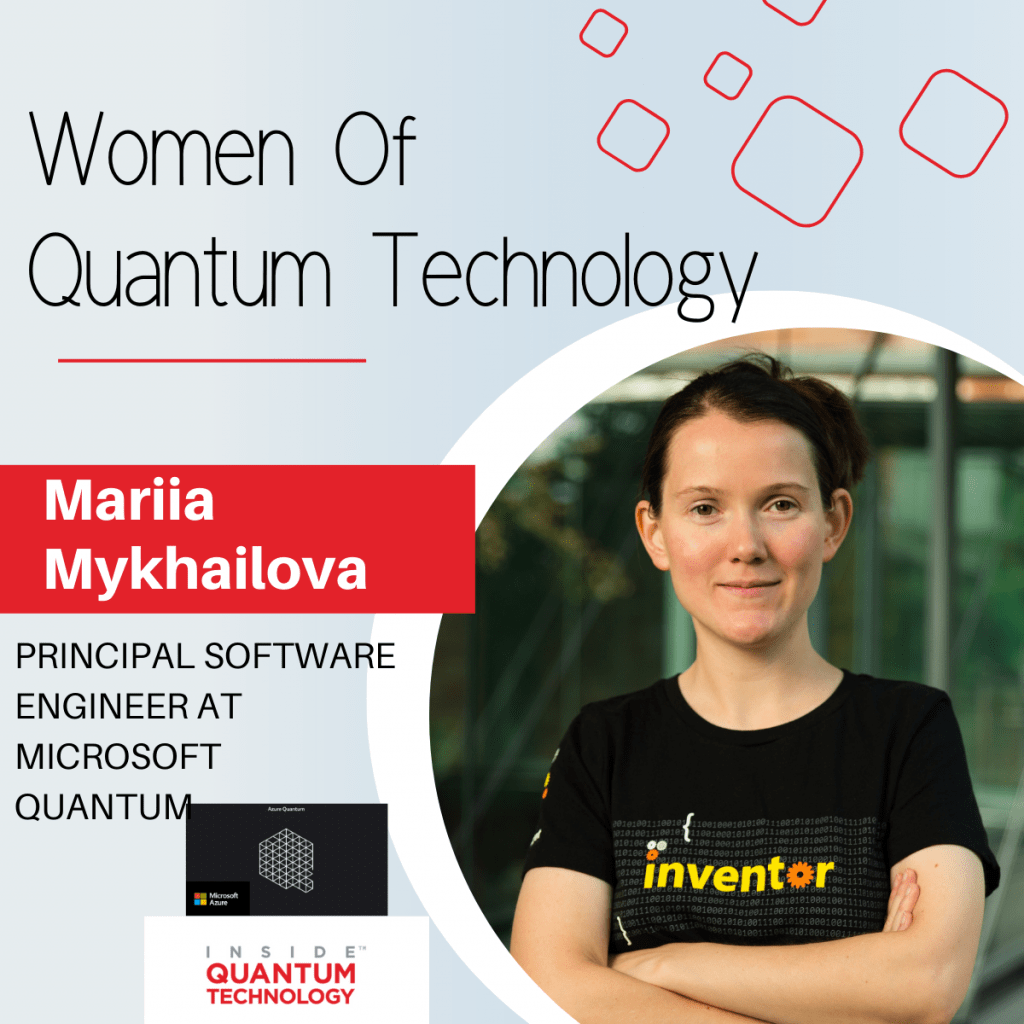Like many women within the quantum industry, Mariia Mykhailova, a Principal Software Engineer at a leading quantum computing company, Microsoft Quantum, credits powerful female role models for inspiring her journey into quantum computing. “Both my mother and grandmother were software engineers,” explained Mykhailova. “My grandma was one of the first software engineers in Ukraine, one of the first people who got an education as a computer scientist. She worked all her life in this role.” Taking inspiration from her mother and grandmother, Mykhailova pursued computer science before becoming a successful part of Microsoft Quantum. She hopes to pass on her grandmother’s and mother’s legacy and be a role model for others in the quantum industry.
Mykhailova did not originally plan on working in the quantum industry, as she didn’t even realize jobs existed in that space. “I received classical training as a computer science person,” she stated. “In Ukraine, it was called applied informatics, and it had a lot of physics, a lot of math, and surprisingly little actual computer science.” After graduating, Mykhailova joined Ukraine’s banking software industry. “So, I spent several years working in a company that developed software for banks,” Mykhailova stated. “After that, I moved to the U.S. to join Microsoft, but still in a classical role. I spent the first four and a half years in Microsoft working on Bing and Azure infrastructure.”
It was during her early years at Microsoft that she was exposed to quantum computing. “I discovered it quite accidentally,” Mykhailova explained. “Several years after I joined Microsoft, one of my friends, a researcher within Microsoft Quantum, told me Microsoft does have a program in quantum computing.” Curious, Mykhailova looked into it further. “It sounded fascinating,” she added. “It sounded like something where I could use all the math that I learned at university.” Looking for a new challenge, Mykhailova interviewed for a software engineering role in Microsoft Quantum program and was accepted. “I did it kind of backward compared to what a lot of people do,” she said. Like many in the industry, Mykhailova then began a thorough education process to learn more about the mechanics of quantum computing.
Now a Principal Software Engineer at Microsoft Quantum, Mykhailova works on helping others on the same learning journey she undertook herself. Though the process was far from easy. “The first time I implemented Grover’s search,” Mykhailova said, mentioning the famous quantum algorithm, “I made a classical mistake. I didn’t get the idea that there is an optimal number of iterations you need to do. So, I figured that, well, in the classical world, generally the more iterations you have the better. So, let’s do a 1000 iterations and see what happens. And I did not get the result that I expected.” This experience inspired Mykhailova to develop quantum programming tutorials and exercises for anyone to use in learning quantum computing on their own – the Quantum Katas. In this project, Mykhailova emphasized the need for immediate feedback. “I was in a rather privileged position,” she explained. “I had the rest of the Microsoft Quantum team at my disposal. So, I would work on some problems, and then I would go to the kitchen and wait for some unsuspecting researcher to wander in, and then I would ask my questions. Most people don’t have this type of access to quantum computing experts, so they really need an alternative way to get immediate feedback on their work.” Mykhailova highlights the importance of feedback also within her own team, making sure everyone is able to hone their skills.
Following her passion for quantum education, Mykhailova also teaches a class on quantum computing at Northeastern University. She began teaching just two months before the COVID-19 pandemic hit. “Transitioning from in-person teaching to online in the scope of one week was a jarring one,” Mykhailova said. She has also written a pocket guide on the quantum computer programming language Q#, which she uses in her class. “I also shared it with my interns this summer, “Mykhailova added. “It was a lot easier for me to point them to a specific page in the book as the answer to their question than to try and come up with an example on the fly.”
In looking at her mother and grandmother as role models, Mykhailova also hopes to be a similar role model for other women at Microsoft Quantum and in the quantum industry and help make it more inclusive. “Whenever I get an invitation to do some kind of mentoring, either one-on-one or talking to a group of students about what life is like in the industry, I always try to take it,” Mykhailova said. She also posits that getting to the root causes for the lack of diversity and the lack of retention within the quantum industry is key. According to Mykhailova: “People either are not attracted to this field or they’re not staying. So, on one hand, there has to be the initial step to entering the field and thriving there. On the other hand, there has to be a basis for continuing to work there.” Mykhailova believes that answering these tough questions can inherently make the industry more inclusive. But she also suggests a wider range of exposure to quantum computing. “I believe in giving people opportunities to engage with the industry as early as possible,” Mykhailova said. “So, things like internships, mentorships, or working with people on open-source contributions, this helps people develop some of those skills and connections and see what it is like to work in the industry.”
Kenna Hughes-Castleberry is a staff writer at Inside Quantum Technology and the Science Communicator at JILA (a partnership between the University of Colorado Boulder and NIST). Her writing beats include deep tech, the metaverse, and quantum technology.
